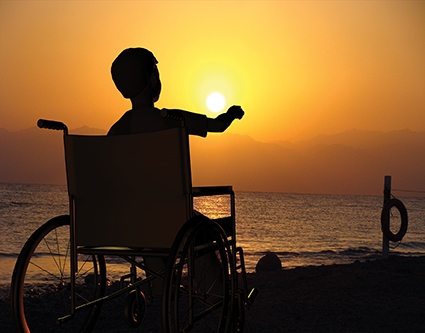The Big Spender: What City Hall Pays out for Disabled ‘Summer Camps’
The Resort Service Program for Persons with Disabilities is one of several programs for persons with disabilities administered by Tbilisi City Hall. While conditions at the resorts are improving, parents of children with disabilities still complain about gaps in the program.
The city spends more on these camps than they do on other programs for the disabled. In 2016, the budget for the resort program was GEL 715,845.00 (about $294,000). By comparison, the entire budget for all who are eligible for the program “Assistance for Socially Unprotected Persons with Disabilities Under the Age 18” was GEL 369,000 (about $153,000).
Tbilisi's Department of Health and Social Services has administered the program since 2008, allowing children with disabilities and their parents to spend a holiday at either mountain or sea resorts within Georgia. In recent years, Ureki and Anaklia have been most often chosen as Black Sea resorts and Bakuriani and Borjomi as mountain resorts.
Children with disabilities ages 3-21 and a parent or legal guardian can participate. According to the Ministry of Labor, Health and Social Services, 31,066 people in Tbilisi with disabilities receive aid packages or support from the government. Slightly more than 10 percent (3,285) are aged 3-21.
Tengiz Tevzadze, coordinator of social programs for the Department of Health and Social Services, said that in 2016 there were 1,023 applicants and 900 were accepted. In 2015, 816 were accepted.
Tevzadze says participants must have documents proving they are registered in Tbilisi or receive services from a daycare center located in Tbilisi. His department decides who is chosen. “There are no special criteria,” he says, adding that the most important factor is the condition of the child. Doctors exam candidates to assess if a child is at risk from complications during travel or at any other stage of the program.
Natia Sharvadze and her son have been participating in the program since 2008 and she prefers to go to the sea resorts. “For several years I went with another adult to help with my son and the hotel administrations often made an exception for the second adult,” she told us. Because of her son’s condition, they cannot travel by bus and so have to travel there by car. “There are people with the same problem who cannot do that, and so they are prevented from participating in the program," she said.
Sharvadze’s son uses a wheelchair, so staying in a hotel located close to the beach is extremely important for her. Children who are blind or suffer from restricted hearing also have special hotel needs.
Tevzadze says hotels are chosen according to simplified electronic tenders. “Two years ago, a Tbilisi City Hall survey found that there is not a single hotel in Georgia completely adapted for persons with disabilities. So we try to choose from the ones which are most suitable,” he says.
Tender documents for 2016 state that potential hotels in Bakuriani should have at least three rooms adapted for people who use a wheelchair. The environment should be "comfortable and adapted to the needs of persons with disabilities" and it is "necessary to maintain sanitary norms".
The program includes therapeutic massages for children who need them. But according to Mari Korkotadze, who heads the organization 'Families against Discrimination' (FAD) and whose son participated in the program in 2016, “it would be better if the program provided art therapy or sensory therapy with specialists. “It’s not important to only swim in the sea and lay on the sand," she said. “There should be activities so that children do not sit in front of computers after swimming. Then it would be like a summer camp."
Apart from rest, many would also benefit from playing with other children their own age. Korkotadze says children with disabilities are often sent to remote resorts isolated from everyone, which is very similar to what happens to disabled children who are treated in big medical institutions the rest of the year.
The program budget for 2017 has been increased by another GEL 100,000 (about $41,000). Tevzadze said that because some resorts that are chosen may not be suitable for people with certain disabilities, a voucher system has been established through which the disabled person and parent or guardian can pick their own resort. In 2017, those vouchers worth GEL 400 (about $164) will be given to 250 people.
Sharvadze supports the voucher system, but says the money is still not enough. Korkotadze agrees. “For an adult and child, the vouchers should be GEL 800 (about $328),” she says.
Nino Abdaladze, ifact.ge












